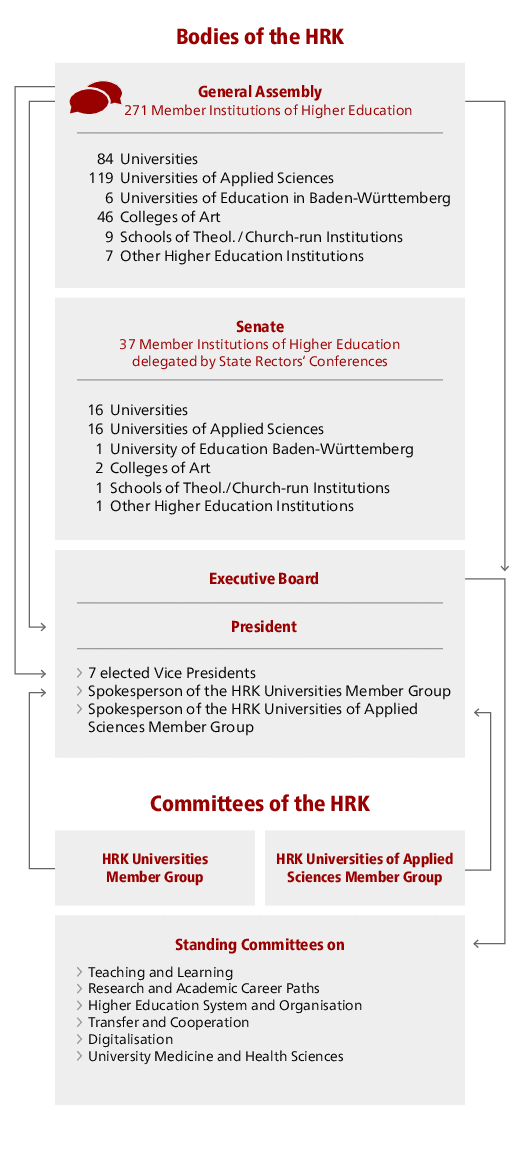Structure

Boards
Opinion-forming and decision-making in the HRK takes place in the General Assembly, the Senate and the Executive Board. Decisions and recommendations are prepared by the Members' Groups, the Committees and the Working Groups. Decision-making bodies are the General Meeting, the Senate and the Executive Board. More

The General Assembly
The General Assembly is the supreme decision-making body: it discusses and decides on questions of general principle and issues of particular importance, for example on amendments to the HRK statutes and on the budget. It elects the members of the Executive Board with the exception of the representatives of the Members' Groups.
The Senate
The Senate discusses medium and longer-term initiatives and strategies and decides on urgent issues, taking particular notice of developments and concerns at the Länder level. The institutions of higher education have different voting rights in the General Assembly and the Senate, depending on size (General Assembly) and type of institution (Senate).
The following table shows the different types of member institutions and how they are represented in the General Assembly and the Senate.
| Group | Members | Votes General Assembly | Votes Senate |
| Universities | 84 | 370 | 33 |
| Universities of Applied Sciences | 119 | 219 | 16 |
| Universities of Teacher Education in Baden-Württemberg | 6 | 8 | 1 |
| Colleges of Art | 46 | 46 | 2 |
| Schools of Theology and Church-run Institutions | 9 | 9 | 1 |
| Other Higher Education Institutions | 7 | 13 | 1 |
| Total | 271 | 665 | 54 |
Members' Groups
The HRK statutes stipulate that universities and universities of applied sciences form members' groups, which elect a spokesperson and hold a meeting at least once a year. (The other types of institutions of higher education have the same option.) Members' group meetings serve as a forum for exchanging opinions about all issues relating to the particular type of higher education institution. Resolutions and recommendations adopted during the meetings are submitted to the Executive Board or the Senate and the General Assembly for consideration.
Executive Board
The Executive Board consists of five Vice Presidents, who are elected by the General Assembly, and the two spokespersons elected as Vice-Presidents by the Members' Groups of the universities and universities of applied sciences. Vice Presidents are elected for two-years and may be re-elected up to two times.
The President
The President heads the Executive Board. He or she represents the HRK internally and externally, is responsible for the day-to-day business and convenes and chairs the meetings of the various decision-making bodies. The term of office is three years and holders may only be re-elected once.
Standing Committees
Six Standing Committees (chaired by the respective Vice President) and Working Groups are convened for the purpose of conducting intensive debate on current higher education policy issues and for preparing the decisions of the General Assembly. In addition to the rectors and presidents, the committees include experts from institutions of higher education and from non-university establishments.
Annual meetings
At the Annual Meetings, representatives of all member institutions discuss issues relating to the future of higher education with invited representatives of social and political groups.
Administration and Budget
Since 1965, the legal and financial affairs of the Hochschulrektorenkonferenz have been managed by the Stiftung zur Förderung der Hochschulrektorenkonferenz (Foundation for the Promotion of the HRK), which is overseen by an advisory body and by the General Assembly of the HRK. The Board of the Stiftung consists of the President, the Vice Presidents and the Secretary-General of the HRK.
In 2017, the Stiftung zur Förderung der Hochschulrektorenkonferenz administers a budget of around 4,35 million EUR. Funds are mainly raised through grants from the Länder and from the Federal Ministry of Education and Research.
